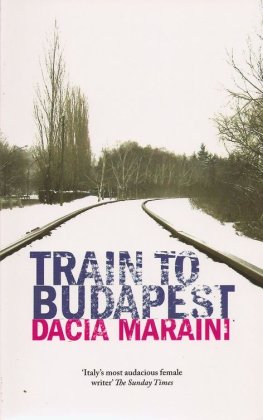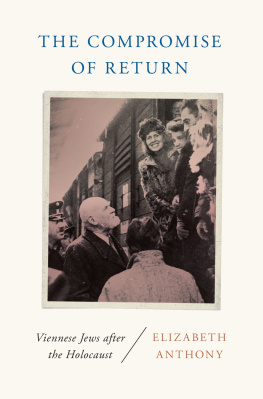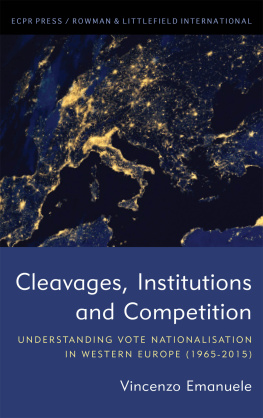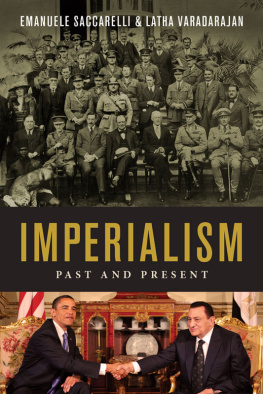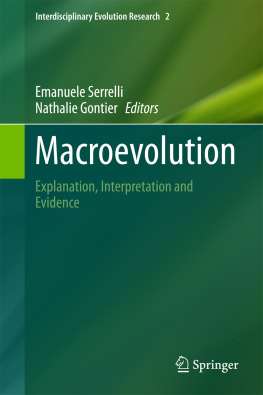Dacia Maraini
Train to Budapest
I asked myself what I was doing there, with a sensation of panic in my heart as though I had blundered into a place of cruel and absurd mysteries not fit for a human being to behold.
He seemed to stare at me [] with that wide and immense stare embracing, condemning, loathing all the universe. I seemed to hear the whispered cry, The horror! The horror!
JOSEPH CONRAD, Heart of Darkness
The slow train struggles northwards. Amara sits composed and dignified, gripped by a sort of sleepy excitement. This is the first long journey of her life. The train stops at every station. Its seats are graced with handmade doilies and it stinks of boiled goat and permanganate soap. The smells of the cold war that has divided the countries of the West from those of the East, segregating them behind walls, barbed wire and soldiers armed with rifles.
This separation bears witness to the assertion of a suspicious and aggressive form of communism. And on the other side is an equally suspicious and vehement anti-communism. Basically, neither side knows anything about the other. Surely we want our readers to know how people really live beyond the Iron Curtain? About what still may remain of the suffering caused by the Second World War? About what survives of the memory of the Holocaust?
The voice of the editor of the newspaper she works for as he reminds her to notice details, to talk to people, to study the daily lives of those living in the East of Europe, and then to write. The editor is young and good-looking and completely bald. He favours her with an exceptionally charming smile as he adds that she cannot be paid very much for her contributions.
But my dear Sironi, you are at the very outset of your career, you know how much I admire the clarity of your writing, but I could not possibly pay a beginner more. On the other hand, you will be able to telephone the paper free of charge and dictate your articles directly to a call-corder. This is the first time for years that the international lines to the East have been working, even if only for a few hours a day. We have good connections with Austria; as for Czechoslovakia and Poland, I dont know. We shall have to see. Do you good to try. Please collect your special journalists pass from the secretarys office.
He had provided her with a piece of paper with the phone numbers of the Italian newspaper agencies in the various cities of Europe and, after giving her a fatherly kiss on both cheeks, closed the door behind her.
The train had been held up for hours at the border between Italy and Austria, and now it has reached the frontier between Austria and Czechoslovakia. Soldiers have taken away everyones passport and left the haggard passengers locked in their carriages, only dimly discernible under a tiny service light.
The locomotive puffs impatiently, anxious to get going, but is held back by something with more energy than a mere engine: the dark, tenacious, mindless and obtuse power of frontier bureaucracy. Night has descended unnoticed by the travellers. Nothing can be heard outside but the tread of soldiers. It is hot in the locked carriage. Amara is sharing the compartment with two men and a young mother with a newborn baby in her arms. The older of the two men, in a blue windcheater, is trying to lower the squeaking window. When he stretches his arms fur armbands can be seen.
A gust of fresh air blows briskly into the carriage. Amara puts her head out to breathe a little better. All she can see is the gloom of a starless night. Far off, to the right, some tiny lights are flickering. A village? No dogs can be heard barking, no donkeys braying. It is like being suspended in the void. A soldier shouts. He comes up and beats on the lowered window with the butt of his rifle. Opening the windows is forbidden! There are no other openings or slits on this train trying to slink not so much from one country to another as from one civilisation to another, from one ideology to another, from one mentality to another. An old train with very few passengers on board, a chain of decrepit carriages struggling to force a way through the armour-plated barrier dividing the world. And who are these reckless travellers? How can they be so bold?
Inside the carriage, with its dim little blue light, they start talking. One of the two men is Slovak; the other half-Austrian and half-Hungarian, and they communicate in German. The woman holding the baby understands nothing but her own dialect from Gdask.
The man with fur armbands says hes on his way to see his family in Kladno. The other man, who has a line of gazelles running across his jumper, talks of a pregnant daughter expecting him in Pozna. The woman just repeats the name Gdask over and again. She cradles her pale silent child and murmurs Gdask, Gdask.
And where are you off to? the man with the gazelles asks Amara.
Birkenau.
Auschwitz-Birkenau? And for what, if its not too impertinent to ask?
I have to write some articles for my paper. But I shall also be looking for traces of someone who disappeared in 43.
The man in the blue windcheater makes no comment. His fur armbands sparkle in the half-darkness. What use can they be? But the man with the gazelles seems impressed and interested. My mother also died in a Nazi camp, at Treblinka, he says in a small voice, concentrating on Amara. Was your relative Jewish?
He wasnt my relative. But he was Jewish, yes.
And you want to try and trace a man who wasnt even a relative. Arent you afraid?
Its something I promised myself to do.
Ah!
In that Ah is understanding and a discreet curiosity. To Amaras ears his words do not sound like idle chat. They seem shot through with an honest desire to understand. She looks more closely at him: a man of about forty with thin arms and a very long neck that emerges like a Modigliani image from a dark collarless shirt; he has wide eyes, high cheekbones and a soft mouth marked by small concentric wrinkles. She would have liked to tell him something about the child Emanuele and his passion for flying and of the cherries that smelled of the wild and his illness and his letters and his disappearance. But the man in blue, the one with fur armbands, scares her.
Every now and then a soldiers helmet appears at the bottom of the window and runs along the edge of the glass like a turtles back. First from right to left, then from left to right. The night has freshened the air. Amara pulls her woollen cardigan round her shoulders. She is beginning to doze. Maybe shell be able to sleep for a few minutes against the bald threadbare velvet of the seat.
When she opens her eyes the man with fur armbands is snoozing in front of her, mouth wide open, hands lying abandoned on his thighs. The young mother is still cradling her baby and humming a little song. The man with the gazelles on his chest starts talking quietly, his mouth nearly touching her ear.
Im afraid they wont let me go any further.
Why not?
I have an Austrian passport. My mother was Jewish-Hungarian, and I worked as a journalist for several years.
Is all that in your passport?
They have information and lists. The only thing that works in this country is lists. He sounds like a conspirator, but there is mockery in his smile. A wisp of brown hair streaked with grey slips across his brow. His breath smells of dried figs and also a little of wine, as if he has just come from a cellar where they stack oak casks and baskets of figs. Something about him reminds her of her father: the timid smile, the thick smooth hair tending to slide over his forehead, the grey eyes edged with green. The pale figure reflected in the window is serene and attractive, even if marked by time with a few small wrinkles. Now he seems to have turned away from her to snooze, his head propped against his seat. He has such an abandoned, defenceless air that she feels an urge to protect him. In the same way as the young mother in the far corner of the carriage is supporting the heavy head of her little girl only a few months old.

